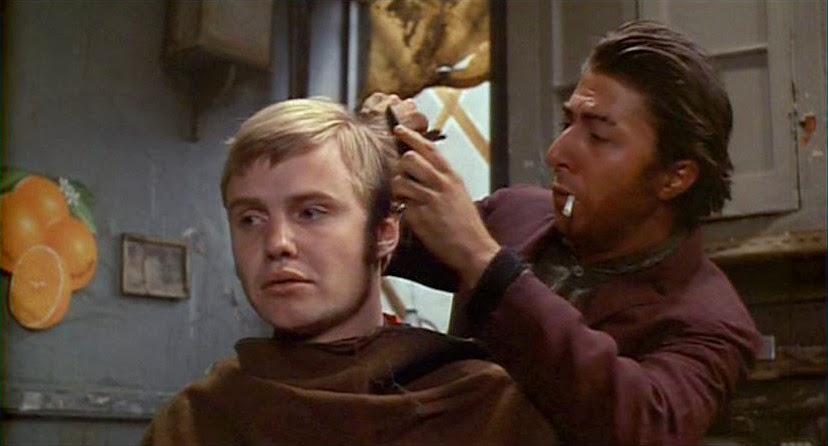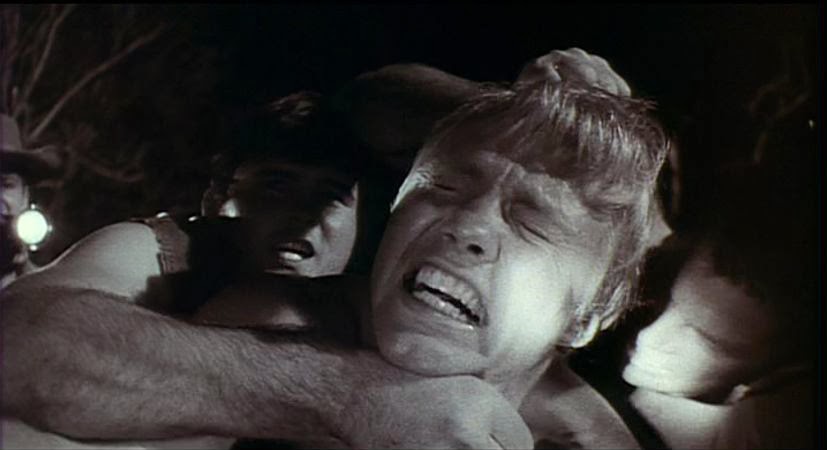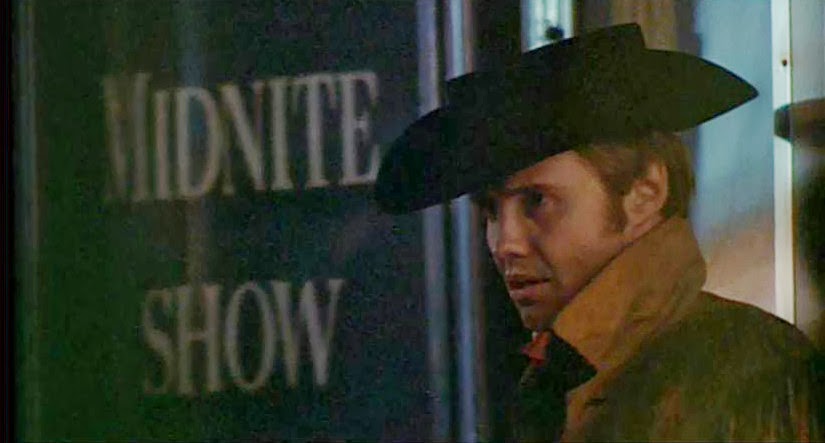I’m sometimes asked if I only like movies about women, or if
a film has to have a female protagonist in order for me to enjoy it. Granted, even
a cursory look at the films I list amongst my favorites would lean toward the answer being, yes; but the truth is, I’m not drawn specifically to movies about women so much as I
have a strong aversion to what passes for manhood in a great many
motion pictures. Preoccupied as most films are with perpetuating a narrow, outmoded, and distinctly white, hetero-normative vision of manhood, often consisting of oversimplified macho/hero
stereotypes and care-worn heroism tropes, I have merely grown weary of outsized masculine totems standing in for fleshed-out, human-scale men.
Never being one to find plot-driven action and adventure to be a preferable alternative to the intensity of simple emotional conflict, I gravitate instead to movies about flawed characters grappling with the human condition. That these have largely been movies about women says more about our culture’s rigidity in its onscreen depiction of masculinity than it does any gender preferences I may hold in the way of narrative central characters.
Never being one to find plot-driven action and adventure to be a preferable alternative to the intensity of simple emotional conflict, I gravitate instead to movies about flawed characters grappling with the human condition. That these have largely been movies about women says more about our culture’s rigidity in its onscreen depiction of masculinity than it does any gender preferences I may hold in the way of narrative central characters.
 |
| Joe Buck sees the cowboy as the epitome of hetero-masculinity |
Happily, a great deal of this changed (albeit briefly) in
the late-'60s with the emergence of the movie anti-hero. The New Hollywood, in its
youthful repudiation of America's cinematic status-quo, challenged the old-fashioned concept of
masculinity and reimagined the traditional Hollywood leading man as an
individual of unprepossessing countenance (Elliott Gould, Richard Benjamin,
Malcolm McDowell, et. al.) capable of uncertainty, and more apt to be at war
with some inner aspect of his character than to be found pointing a .44 Magnum at
some punk and asking, “Do you feel
lucky?”
 |
| Urban Cowboy Archaic notions of masculinity collide with the modern world |
 |
| Jon Voight as Joe Buck |
 |
| Dustin Hoffman as Enrico Salvatore Rizzo |
 |
| Sylvia Miles as Cass Trehune |
 |
| Brenda Vaccaro as Shirley |
Midnight Cowboy is
the story of Joe Buck (Voight), a naïve Texas dishwasher with a sad, abandoned
past who, possessed of little beyond an elemental self-awareness—“The one thing I ever been good for is lovin’”—seizes upon the tin-pot ambition of going to New York and making it big as a
sought-after gigolo, servicing the sexual needs of neglected, Park Avenue
socialites. Unfortunately, a string of bad breaks (not the least of them being Joe’s
ignorance of the largely homosexual implications drawn from his beloved cowboy
attire in a Metropolitan setting) results in a drastic reversal of fortunes for Joe, leading
to his forging an unlikely friendship/bond with a tubercular, disabled grifter
and pickpocket: one Enrico Salvatore Rizzo (Hoffman), or, as he's loath to be called, Ratso.
In detailing the tentative alliance between these two
wounded misfits, director John Schlesinger (Darling,
The Day of the Locust) and screenwriter Waldo Salt (from the James Leo
Herlihy novel), have not
only fashioned one of the screen’s great (platonic) love stories, but in the bargain create a terribly moving and heartrending essay on isolation and the need
to be needed.
The kind of mature-themed major motion picture unimaginable in today’s teen-driven multiplex marketplace, the then X-rated Midnight Cowboy fairly knocked me for a loop when I saw it in 1969 (I was fairly shaken by it, finding some parts absolutely harrowing, later feeling heartbroken and bawling my eyes out at the end...then staying to watch it all again). I was just 12-years-old at the time, and in my film fan fervor, Midnight Cowboy looked to me like the future of American movies. Strange to think of it now in the age of Iron Man and The Avengers, but try to imagine: I was only an adolescent movie enthusiast, but already I'd had the good fortune to have been exposed to the brilliance that was Who’s Afraid of Virginia Woolf?, Rosemary’s Baby, Secret Ceremony, and Bonnie and Clyde…and They Shoot Horses, Don’t They? was just around the corner.
Like an unspoken promise, the quality of these movies led me to the optimistic (naïve?) belief that American films were headed in an entirely new direction. I thought that motion pictures, freed from the constraints of censorship by the dissolution of the Production Code and recently-relaxed definitions of obscenity, could at last take their place as the emergent pop-cultural art form of the 20th century. Alas, conservatism and consumerism ultimately won out, but for a brief time there, Hollywood was turning out the most AMAZINGLY offbeat and thought-provoking movies. Small wonder that the '60s and '70s still linger in my memory as my absolute favorite era in American film. I see now that it's because we were both growing up at the same time.
 |
| X-Rated Bernard Hughes appears as Townsend "Towny" P. Locke in one of Midnight Cowboy's most controversial scenes |
WHAT I LOVE ABOUT THIS FILM
Putting aside for a moment Waldo
Salt’s absolutely incredible screenplay (and if you've read Herlihy's novel you know what
a splendid adaptation it is), as far as I’m concerned, cinematographer Adam Holender
(Puzzle of a Downfall Child) and composer
John Barry (and all sundry music contributors) are as much the stars of Midnight Cowboy as Voight and Hoffman.
Displaying the kind of seamless collaboration which served to both feed and mislead auteur theorists critics back in the day, Holender and Barry create a look and sound for Midnight Cowboy so cinematically well-suited to its themes of fractured dreams and abandoned hopes (the use of disorienting flashbacks and subjective audio were considered innovative for its time), that the mode of storytelling becomes as important as the story itself. And, of course, who can listen to Fred Neil's Everybody's Talkin' (sung by Harry Nilsson) without visualizing Joe Buck strutting like a peacock down the crowded Manhattan streets, the diminutive Ratso Rizzo at his side, struggling to keep up.
Displaying the kind of seamless collaboration which served to both feed and mislead auteur theorists critics back in the day, Holender and Barry create a look and sound for Midnight Cowboy so cinematically well-suited to its themes of fractured dreams and abandoned hopes (the use of disorienting flashbacks and subjective audio were considered innovative for its time), that the mode of storytelling becomes as important as the story itself. And, of course, who can listen to Fred Neil's Everybody's Talkin' (sung by Harry Nilsson) without visualizing Joe Buck strutting like a peacock down the crowded Manhattan streets, the diminutive Ratso Rizzo at his side, struggling to keep up.
Repeat viewings reveal the incredible amount of backstory and character exposition that's relayed through the film's economic and artful use of flashbacks and dream sequences. Everything you need to know about Joe Buck's troubled past is revealed in jarring flashes, like memories he's trying to repress. But I find the true richness of this device in that it reveals so much without explaining anything. It's both refreshing and challenging when a film asks you do some of the work yourself.
PERFORMANCES
Midnight Cowboy is
so chock full of amazing performances that it becomes an exercise in futility to extol
the virtues of any one particular actor. Still, each time I watch it, I find I'm left with lingering impressions of newly-discovered bits of brilliance in performances I thought I was long-familiar with.
 |
| "I got a strange feelin' somebody's bein' hustled!" - Doris Day in Calamity Jane Oscar-nominee Sylvia Miles makes more out of 6 minutes-worth of screen time than any actress I've ever seen. As the Park Avenue "socialite" with the braying voice and whiplash temper, Miles creates a vividly dimensional character out of little more than a sketch. I could go on about what I adore about her performance, but I couldn't put it any better (or more hilariously) than a fellow blogger does HERE |
Midnight Cowboy was my first exposure to both Jon Voight and Dustin Hoffman, both of whom give the kind of performances that make stars. Some of the actors considered for the role of Joe Buck include: James Caan, Don Stroud, Alan Alda (!), Michael Sarrazin, Lee Majors, Alex Cord, Gary Lockwood, Robert Forester, and Michael Parks.
Hoffman is, of course, a revelation, especially in light of the extreme departure Ratso Rizzo is from his work in The Graduate; but it's the sad-eyed Jon Voight who ratchets up the film's pathos by way of achieving, in his portrayal of the hapless hustler Joe Buck, what I've always admired in the work of Julie Christie: the ability to instill in shallow, not-very-bright characters, a considerable amount of inarticulate depth.
THE STUFF OF FANTASY
Fantasy isn't perhaps the best word to describe what I mean, but I adore the seedy, grimy look of late '60s New York captured in Midnight Cowboy. It's an Alice Through the Looking Glass view of Manhattan inspired, one can't help but assume, by Brit director John Schlesinger's unfamiliarity with the city, and his fascination with its sordid contrast to the cheery image of America presented in advertising and TV commercials. As would be the case in later years in films like Klute (1971) and Taxi Driver (1976), Midnight Cowboy uses New York as though it were another character in the story.
THE STUFF OF DREAMS
As it is rare for a director to even turn out ONE classic film in the entirety of their careers, I find it sometimes a little baffling how easily John Schlesinger's name—the man who gave us Midnight Cowboy, Darling, and The Day of The Locust...three genuine classics, in my book—is so often bypassed in discussions of great directors. Even the gay community rarely gives it up for this director (to my knowledge, the only "out" director working in mainstream film at the time) whose body of work is decidedly uneven, but nonetheless yields several impressive efforts. Happily, Schlesinger won the best directing Oscar for Midnight Cowboy, and the film won Best Picture that year (Salt also won for his screenplay).
There’s no telling what, if any, impact Schlesinger’s sexuality had on the way Midnight Cowboy turned out (after all, the original novel was written by a gay man, but adapted by a straight). But even by today’s standards, what still impresses me about Midnight Cowboy is how strongly it stands as one of mainstream cinema’s most persuasive examples of the purposeful deconstruction of the masculine myth.
Joe Buck embraces a traditional concept of masculinity no
longer considered relevant or even valid in an urban (modern) environment. In fact,
Joe is rather stunned to learn that everything he once thought represented masculinity and manhood (macho posturing, sexual pursuit, and dressing like a
cowboy) has, somehow, become perversely feminized ("You're gonna tell me John Wayne's a fag?!"). Manliness of the sort he admired as a boy in the movies, or copied from the rodeo cowboys that populated his
grandmother’s bed, had transmogrified into the macho “drag” adopted by homosexual prostitutes
plying their trade on New York's Forty-Second Street.
 |
| Joe discovers he's but one of many Midnight Urban Cowboys |
Like a great many men who haven't a clue as to how to view themselves without clinging to an antiquated hunter-gatherer/alpha-male paradigm; Joe, without a defined code of “masculinity” to follow, is at
a loss. Ironic, because, as revealed in the novel and an early draft of the screenplay, what inspires Joe to come to New York in the first place is his learning that the urban phenomenon of the overworked businessman has resulted in a surplus of sexually frustrated city women. In short, Joe believes there is a shortage of "real men" in New York, and his goal is to step in and fill the void, so to speak.
Even within the sex trade where he hoped to make his fortune, Joe finds himself unwittingly cast in the feminine role of being the one pursued by males rather than in the (equally passive) part of easygoing stud sought after by women. Yet, in his inarticulated longing to love and be loved (his only familiarity with it is as a purely physical act) Joe finds the closest thing he has ever known of it in the deep friendship he develops with another male. One every bit the misfit he is.
Even within the sex trade where he hoped to make his fortune, Joe finds himself unwittingly cast in the feminine role of being the one pursued by males rather than in the (equally passive) part of easygoing stud sought after by women. Yet, in his inarticulated longing to love and be loved (his only familiarity with it is as a purely physical act) Joe finds the closest thing he has ever known of it in the deep friendship he develops with another male. One every bit the misfit he is.
 |
| Scenes of Domesticity |
And for a rather bleak and somber film, I think that's a really lovely, bittersweet message to end with.
THE AUTOGRAPH FILES
 |
| Bernard Hughes - 1980 |















.JPG)



.JPG)




.JPG)


